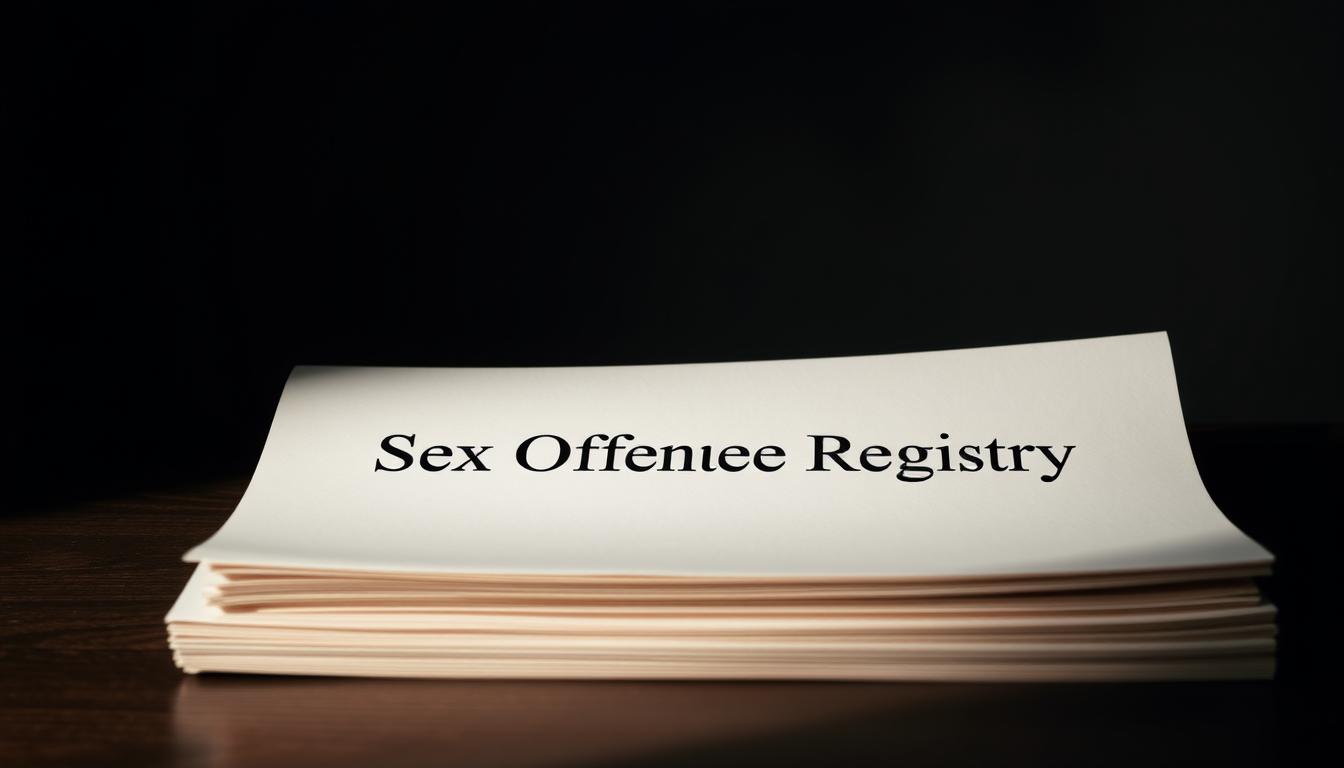The sex offender registry is a key tool for law enforcement and public safety. But, it can have big effects on those listed. Nearly 800,000 registered sex offenders are living in the United States, says the National Center for Missing & Exploited Children.

Knowing about sex offender registry duration is key. It helps people understand the laws and how they affect daily life.
I will give a detailed legal explanation. This will help clear up how long a sex offender stays on record.
Key Takeaways
- The sex offender registry is a public database that contains information about registered sex offenders.
- Registration duration varies by state and is influenced by the type of offense.
- Understanding the registry duration is crucial for individuals to plan their lives.
- Registration laws are complex and can have significant implications.
- Seeking legal counsel can help individuals navigate the registration process.
Understanding Sex Offender Registration in the United States
The U.S. has a system to register sex offenders to keep communities safe. Laws at both federal and state levels guide this system. It aims to track those convicted of sex crimes.
Purpose of Sex Offender Registries
Sex offender registries give the public info on offenders. This helps keep communities safe. Law enforcement can track and monitor these offenders to stop future crimes. The registries include details like the offender’s name, address, and crime.
“The goal of sex offender registration is to provide a tool for law enforcement to keep track of individuals who have been convicted of sex crimes, aiding in the prevention of future offenses.”
History and Development of Registration Laws
The U.S. started sex offender registration in the 1990s. The Jacob Wetterling Act of 1994 was a key law. It made states create these registries. Since then, laws have changed, with big updates in 2006.
| Year | Legislation | Impact |
|---|---|---|
| 1994 | Jacob Wetterling Act | Mandated creation of sex offender registries |
| 2006 | Adam Walsh Act | Standardized registration requirements nationwide |
Knowing the history and purpose of sex offender registration helps understand how long someone stays on the list.
Federal Sex Offender Registration Laws
Understanding federal sex offender laws is key. The main law is the Sex Offender Registration and Notification Act (SORNA). It guides how sex offenders are registered at the federal level.
The Sex Offender Registration and Notification Act (SORNA)
SORNA aims to make sex offender registration the same everywhere in the U.S. It outlines what offenses need to be reported and how long offenders must stay registered. SORNA divides sex offenders into three tiers, with Tier III being the most serious.
Federal Requirements for Registration
Sex offenders must register in states where they live, work, or go to school. They must give personal details like name, address, and offense information. Not following SORNA’s rules can lead to harsh penalties, including jail time. Here’s a quick look at what’s needed for registration:
| Registration Requirement | Description |
|---|---|
| Initial Registration | Offenders must register before release from prison or within three business days of sentencing if not incarcerated. |
| Information to be Provided | Name, address, social security number, vehicle information, and offense details. |
| Registration Duration | Varies by tier: Tier I (15 years), Tier II (25 years), Tier III (lifetime). |
Knowing these federal rules is vital for those who must register as sex offenders. Staying in compliance helps avoid more legal trouble.
State-by-State Variations in Sex Offender Laws
State laws on sex offender registration vary a lot. This affects how long someone stays on the registry. The time can change a lot, depending on the state of the crime or where the person lives.
Lifetime Registration Requirements
Some places make sex offenders register for life. This rule applies to serious crimes. This rule can make it hard for people to get back into society.
A legal expert said, “Lifetime registration can be too harsh. It can stop people from getting better.”
Tiered Registration Systems
Other states use a tier system. The length of registration depends on the crime’s severity. This system tries to balance public safety and personal rights.
For example, less serious crimes might let people off the registry after a while. But only if they haven’t done anything wrong again.
Notable State-Specific Provisions
Some states have their own rules that are different from others. For example, some places let people off the registry early under certain conditions. A court said, “Being able to ask to get off the registry is key to getting better.”
In summary, the laws on sex offender registration vary a lot from state to state. It’s important to know these differences. This helps people who want to clear their records or understand their status.
How Long Does Sex Offender Stay on Your Record?
The time a sex offender stays on the registry changes based on their risk level. The system uses tiers to sort offenders by the severity of their crime and how likely they are to offend again.

Tier I Offenders: Low-Risk Classification (15-Year Registration)
Tier I offenders are seen as low-risk and must register for 15 years. They usually have committed less serious crimes or are less likely to offend again. They must keep their information up to date during this time.
Tier II Offenders: Medium-Risk Classification (25-Year Registration)
Tier II offenders are seen as medium-risk and must register for 25 years. They have committed more serious crimes than Tier I offenders or are at a moderate risk of reoffending. Their longer registration reflects the higher risk of their crimes.
Tier III Offenders: High-Risk Classification (Lifetime Registration)
Tier III offenders are considered high-risk and must register for life. They have committed the most serious sexual crimes or are at a high risk of reoffending. Lifetime registration is meant to keep them under constant watch for public safety.
Knowing about the tiered system and how long offenders must register is key. It shows why it’s important for offenders to follow registration rules and the penalties for not doing so.
Factors That Affect Registration Duration
The time an individual stays on the sex offender registry varies. Several key factors influence this duration. These factors can make the time on the registry different for everyone.
Nature and Severity of the Offense
The type and severity of the crime are key in deciding how long someone stays on the registry. Crimes that are more serious, like those against minors or involving violence, usually mean longer times on the registry. For example, Tier III offenses, seen as the most serious, often require a lifetime on the registry.
Prior Criminal History
An individual’s past crimes also affect how long they stay on the registry. Those with past crimes, similar to the current one, might have to stay longer. The courts look at this history to judge the risk the offender poses.
Compliance with Registration Requirements
Following the rules of the registry is also important. If someone doesn’t follow these rules, like not updating their info or missing deadlines, they might have to stay longer. They could even face more penalties.
In short, how long someone stays on the registry depends on the crime’s severity, their past crimes, and if they follow the rules. Knowing these factors helps understand the complex laws around sex offender registration.
- Nature and Severity: More severe crimes result in longer registration.
- Prior History: Previous convictions can extend registration duration.
- Compliance: Failure to comply can lead to penalties and longer registration.
Juvenile Sex Offenders and Registration Requirements
When we talk about sex offender registration, we see that kids face special rules. These rules help them get better while keeping everyone safe. The laws for kids are different from those for grown-ups.
Special Provisions for Minors
Kids who commit sex crimes get special treatment. This treatment helps them get back on track. Laws in many places let kids clear their records under certain conditions.
Keeping their info private is important. Unlike adults, kids’ registration info is often not shared publicly. This helps protect their privacy and makes it easier for them to move forward.
Duration Differences for Juvenile Offenders
Kids have to register for a shorter time than adults. While adults might have to register for 15 years or forever, kids usually don’t have to for as long. Some places let kids ask to be removed from the list after 5 to 10 years, if they’ve stayed out of trouble.
The exact time and rules depend on the crime and the kid’s past. This way, kids get a chance to change and grow, knowing they can start fresh.
The Process of Removal from Sex Offender Registry
Understanding how to get off the sex offender registry is complex. It depends on legal rules and procedures. Since laws differ by place, knowing your local rules is key.
Eligibility Requirements for Removal
To qualify for removal, you must meet certain conditions. These might include:
- Finishing the required registration period, which can be 10 to 25 years or more, based on your offense and where you live.
- Following all registration rules, like keeping your info up to date.
- Not getting convicted of any new sex crimes or serious offenses.
It’s important to check your local laws or talk to a lawyer to see if you qualify.
Petition Process and Legal Procedures
To start the removal process, you need to file a petition with the court that handled your case. This involves:
- Writing the petition, explaining why you should be removed and including evidence.
- Submitting the petition to the court and telling others involved, like the prosecutor.
- Going to a hearing where the judge will decide based on your evidence and arguments.
Getting a lawyer can help a lot with this complicated step.
Success Rates and Challenges
How often people get removed from the registry varies. It depends on where you live, your original crime, and how well you’ve followed the rules. Some common hurdles include:
- Meeting strict eligibility rules.
- Dealing with opposition from prosecutors or police.
- Understanding the legal steps of the petition process.
But, many people do get removed each year. This shows the value of not giving up and getting good legal advice.
Expungement and Record Sealing Options
Understanding how to expunge a sex offender record can be tricky. It changes a lot from place to place. Expungement and record sealing are ways to lessen the effects of a sex offense conviction. It’s key to know the differences between them.
Differences Between Expungement and Registry Removal
Many people mix up expungement and registry removal. Expungement means your criminal record is destroyed or sealed. This makes it hard for others to see it. Registry removal is about getting off the sex offender list. Even though they’re related, they’re not the same, and the rules for each can be different.

State Variations in Expungement Eligibility
How easy it is to expunge a record varies by state. Some places let you expunge certain sex offenses after a while. Others are much stricter, making it hard or impossible. Knowing your state’s laws is important to see if you can expunge your record.
The Legal Process for Expungement
The steps to expunge a record are many. You start by filing a petition with the court. Then, you need to give the court certain documents. You might also have to go to a hearing. The whole process can be complex, and you have to prove you’re eligible for expungement.
Impact of Sex Offender Registration on Daily Life
Being on a sex offender registry can change many parts of a person’s life. It can make everyday tasks harder. It also affects job chances and personal relationships.
Employment and Background Check Implications
Being on the registry can hurt job chances. Many jobs require background checks. A registry listing can make it hard to get hired.
Key employment challenges include:
- Difficulty finding employment due to background checks
- Restrictions on job types and industries
- Potential for workplace discrimination
Housing Restrictions and Challenges
Registered sex offenders face big housing problems. Many places won’t let them live there. This is because of laws about where they can live.
Housing challenges include:
- Limited housing options due to residency restrictions
- Difficulty finding landlords willing to rent to registered offenders
- Potential for homelessness due to restrictive laws
Travel and Relocation Considerations
Traveling or moving is hard for those on the registry. They must tell police where they’re going. They might not be able to go everywhere.
| Travel Consideration | Requirement | Impact |
|---|---|---|
| Notification | Must notify law enforcement of travel plans | Restricts spontaneous travel |
| Residency | Must register in new location | Complicates relocation |
| Restrictions | May face travel restrictions to certain areas | Limits travel options |
Legal Rights and Recent Reforms
The United States is still figuring out sex offender registration. New laws and court cases are changing how we see these laws. The rights of sex offenders are a big topic, with many arguing over what’s fair.
Constitutional Challenges to Registration Laws
People are questioning the fairness of sex offender laws. They say these laws can be too harsh. Courts are looking into if these laws are unfair by applying them to crimes committed before the laws were made.
Recent Court Decisions Affecting Registration Duration
Courts have made big changes in sex offender laws. Some laws have been found to be unfair. This has led to changes in how long someone has to register as a sex offender.
Advocacy and Reform Movements
Groups are working hard to change sex offender laws. They say the current system is too strict. New laws are trying to make things fairer by using different levels of risk.
Conclusion
Knowing how long a sex offender stays on record is key for both offenders and the public. We’ve looked into the laws around sex offender registration. This includes federal and state rules and what affects how long someone is registered.
Key points show that how long someone is registered changes a lot. Tier I offenders usually have to register for 15 years. Tier II offenders face 25 years, and Tier III offenders often have to register for life. State laws and personal situations also play a big part in how long someone is registered.
In my final thoughts, understanding sex offender registration laws is very important. Laws keep changing, so it’s crucial to stay up to date. This summary helps you understand the complex world of sex offender registration. It aims to make our discussions more informed.
FAQ
How long does a sex offender stay on the registry?
The time a sex offender stays on the registry varies. It depends on where they live and their risk level. It can be from 15 years to a lifetime.
What factors affect the length of time a sex offender stays on the registry?
Several things can change how long someone stays on the registry. This includes the crime they committed, their past crimes, and if they follow the rules.
Can a sex offender be removed from the registry?
Yes, some people can ask to be removed from the registry. But, each state has its own rules for this. It depends on the state’s laws.
How does the tier classification system affect registration duration?
The tier system groups offenders by risk level. Tier I is 15 years, Tier II is 25 years, and Tier III is for life.
Are there differences in registration requirements for juvenile sex offenders?
Yes, kids who are sex offenders have special rules. Their registration time can be different from adults.
Can a sex offender record be expunged or sealed?
Some states let you seal or expunge sex offender records. But, each state has its own rules. Not all states allow it.
How does sex offender registration impact daily life?
Being on the registry can make life hard. It can affect where you work, live, and travel. There are many restrictions.
What are the legal rights of sex offenders regarding registration?
Sex offenders have rights. They can challenge the laws about registration. Courts have made decisions about these laws.
How long does a sex offender charge stay on your record?
A sex offender charge can stay on your record forever. It can only be removed if you seal or expunge it. This affects how long you’re on the registry.
What is the sex offender registration and notification act?
The Sex Offender Registration and Notification Act (SORNA) is a federal law. It sets standards for sex offender registration and notification. It guides state laws.
How long does it take to remove a sex offender status?
How long it takes to remove a sex offender status varies. It depends on the place you live, your risk level, and the process to petition for removal.
